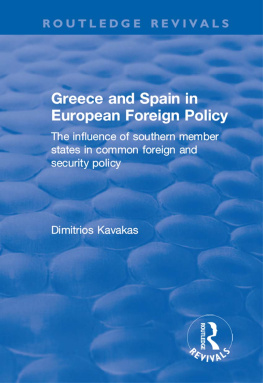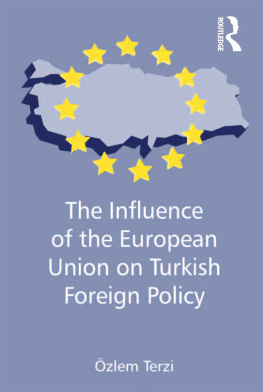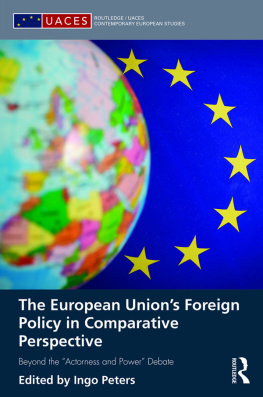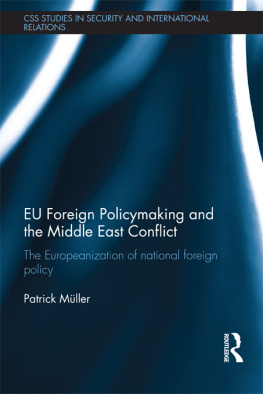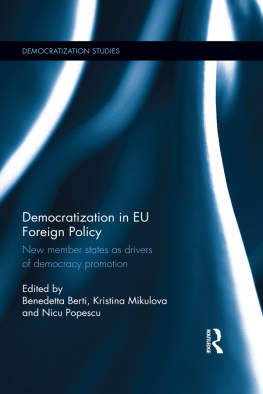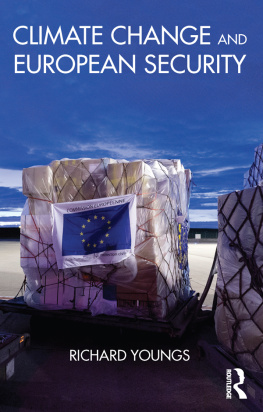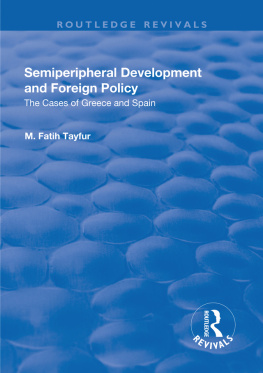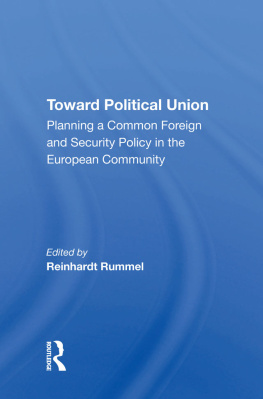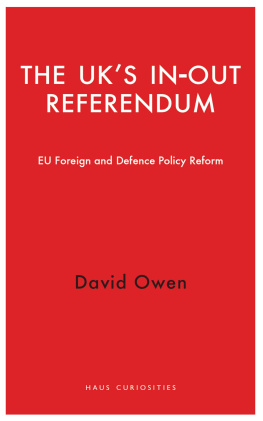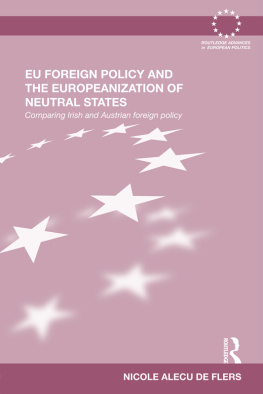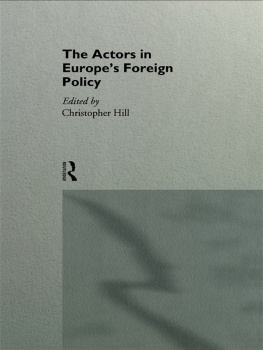GREECE AND SPAIN IN EUROPEAN FOREIGN POLICY
To Mika, my wonderful wife
Greece and Spain in European Foreign Policy
The influence of southern member states in common foreign and security policy
DIMITRIOS KAVAKAS
CEDEFOP
First published 2001 by Ashgate Publishing
Reissued 2018 by Routledge
2 Park Square, Milton Park, Abingdon, Oxon OX14 4RN
711 Third Avenue, New York, NY 10017, USA
Routledge is an imprint of the Taylor & Francis Group, an informa business
Copyright Dimitrios Kavakas 2001
All rights reserved. No part of this book may be reprinted or reproduced or utilised in any form or by any electronic, mechanical, or other means, now known or hereafter invented, including photocopying and recording, or in any information storage or retrieval system, without permission in writing from the publishers.
Notice:
Product or corporate names may be trademarks or registered trademarks, and are used only for identification and explanation without intent to infringe.
Publishers Note
The publisher has gone to great lengths to ensure the quality of this reprint but points out that some imperfections in the original copies may be apparent.
Disclaimer
The publisher has made every effort to trace copyright holders and welcomes correspondence from those they have been unable to contact.
A Library of Congress record exists under LC control number: 2001093278
ISBN 13: 978-1-138-70129-8 (hbk)
ISBN 13: 978-1-315-21007-0 (ebk)
Contents
This book is the work that resulted out of three years of research for my doctorate degree in the University of Leeds. It is almost impossible with only a few words to express my thankfulness to all those who assisted me during those years of my PhD research, which seems to me like a lifetime. Perhaps, the mention of their names here and a very warm thank you, is the least I can do from what they deserve. Perhaps you can allow me first of all to thank God, for he has been the source of life, strength, inspiration and guidance on a daily basis. Every success I have had, has been a gift from him and every failure, a lesson that I had to learn. Through his mercy and his love, not only he gave me a reason in life but also he is guiding my steps according to his will.
I would like to thank my wife Mika for she has been patient and very supportive to me during the times that it seemed that I was dedicating more time to my thesis than to her, particularly during my many research trips. Mika gave me the psychological support that I needed to see this work through to the end, and I wish to thank her for believing in me! I also would like to thank my parents for their support, whether it was through demonstrated love, a kind phone-call of support, or even a helpful cheque!
I would like to take this opportunity to thank from all of my heart Professor Juliet Lodge. I am grateful because she believed in me and gave me the support and the resources that I needed to complete this work. I wish to thank her not only for supporting my research but also for giving me the opportunity to develop my skills in several academic activities that have enhanced my future prospects. I would also like to thanks Dr Neil Winn for his time and effort, for giving me his comments on time, knowing that he must have worked long hours to do this. I would also like to thank Roger and Dot Carswell for they have been like parents to me and gave me the support when I needed it. Also, thanks to Joanna Barchet for the time and effort she took to correct my English. Thanks goes as well to Professor Kevin Featherstone and Dr Hugh Dyer, who were my PhD examiners and awarded me the degree.
CFSP: Common Foreign and Security Policy
CiU: Convergencia i Unio (Catalan coalition party)
COREPER: Council of Permanent Representatives (acronym in French)
COREU: European Correspondence (acronym in French)
CSCE: Conference on Security and Cooperation in Europe
CSCM: Conference on Security and Cooperation in the Mediterranean
DASR: Democratic Arab Saharan Republic
DG: Directorate General
EC: European Community
ECJ: European Court of Justice
ECSC: European Coal and Steel Community
EDC: European Defence Community
EEC: European Economic Community
EMS: European Monetary System
EMU: Economic and Monetary Union
EP: European Parliament
EPC (1): European Political Community
EPC (2): European Political Cooperation
ETA: Basque Liberation Army (acronym in Eusquerra)
EU: European Union
FYROM: Former Yugoslav Republic of Macedonia
GS: General Secretary
IGC: Intergovernmental Conference
KAL: Korean AirLines
LA: Latin America
MEPs: Members of the European Parliament
MFA: Ministry of Foreign Affairs
MFO: Multilateral Force and Observers
MLF: Multilateral Forces
MPs: Members of Parliament
NATO: North Atlantic Treaty Association
ND: New Democracy (Greek political party)
OSCE: Organisation for Security and Cooperation in Europe
PASOK: Pan-Hellenic Socialist Movement (acronym in Greek)
PLO: Palestinian Liberation Organisation
PP: Popular Party (Spanish political party)
PoCo: Political Committee
PSOE: Spanish Socialist Workers Party (acronym in Spanish)
QMV: Qualified Majority Voting
RMP: Renovated Mediterranean Policy
SALT: Strategic Arms Limitation Talks
SEA: Single European Act
TEU: Treaty on European Union
UN: United Nations
VMRO: Macedonian Liberation Organisation (acronym in Macedonian)
WEU: Western European Union
Foreign policy cooperation in the European Union (EU) has taken the form of concentration of national foreign policies. From the early development of European Political Cooperation (EPC) to the formation of the Common Foreign and Security Policy (CFSP), national foreign policies have followed a process of adaptation to a structure of common approaches that allowed for enhanced cooperation. The common approach was the willingness of the founding Six of the European Community to achieve peace and stability in Europe during the Cold War. The structure constituted a method of producing a common position for negotiations for the Conference on Security and Cooperation in Europe (CSCE). This was a method of cooperation in foreign policy through ministerial meetings so that the EC would be represented as one negotiator rather than six.1 Although EU Member States largely retained their sovereignty in foreign policy-making, the changing nature of the EU policy-making meant that decisions and developments in any EU state increasingly became part of the domestic policy arena. Just as domestic politics directly influence the foreign policy of a Member State, similarly, developments in the EU institutions or any of the Member States have the same effect. The development of a European foreign policy can be described as a two-way relationship. On the one hand, the progress of integration has developed a European domestic environment, which is a factor that influences the national foreign policies of Member States. On the other hand, to a varying extent from one state to another, the different national foreign policy priorities influence the European environment and the efforts to develop an EU common foreign policy. Taking into account this complex relation, this book looks at how national foreign policies influence the Common Foreign and Security Policy in the EU. The argument of this book is that national foreign policy behaviour affects the influence of the State in CFSP. This book studies whether and how the geopolitical situation of the state, its domestic political environment, and its political orientation and participation in Europe condition the States foreign policy behaviour in CFSP. It can be argued that this forms a circle of influence where the above factors affect national foreign policy behaviour, the latter conditions State influence in CFSP, which in turn, has an impact on the initial factors. The European political environment has an impact on these factors and results in changes in the national foreign policy. This book studies the levels of interaction between national and European foreign policy. Its objective is to determine the level of influence that a Member State can have, and the extent to which changes in the factors mentioned above could alter this level of influence. In defining influence, it can be argued that it is the relationship between two actors that modifies the behaviour of one actor because of the position of the other. Essentially, this book tests whether endogenous and exogenous factors can alter the variables mentioned above and thus affect foreign policy behaviour.


